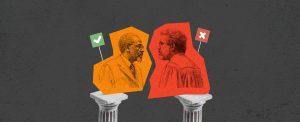Every year, or every few years for some self-regulating professions, members of the profession can run for election as board members, or governors of their profession. It’s a vital dimension of healthy self-regulation, but it is increasingly under threat from voter disengagement and partisan self-interest.
Many self-regulating professions in Canada maintain independence to govern themselves through their membership’s active participation in the democratic process of elections. Through their work on committees and council, elected members of governance provide strategic guidance to the regulator’s operations, determine matters that are relevant to the professions, protect the public interest, and advance the public’s access to the professional services under regulation.
In April 2023, lawyer and paralegal licensees of the Law Society of Ontario had the opportunity to have their say in who should govern the legal professions for the next four years. When the results were announced on May 1, 2023, 40 lawyers and five paralegals were elected to serve as board members of the legal profession in Ontario. In addition to elected board members, Ontario appoints eight lay members to sit as governors of the legal professions.
Low voter participation and partisan behaviors on the part of candidates in governance elections may be viewed as internal threats to self-regulation. Some commentators are sensing that change is on the horizon for Canadian legal regulation.
Low voter participation in governance elections
Not surprisingly, licensee voter participation in governance elections is often low. In the decade leading up to this year’s Law Society of Ontario governance elections, voter participation among lawyers and paralegals has been in decline. In the last governance election in 2019, participation among lawyers was approximately 30%. Voter participation among paralegals was approximately 16%. Some self-regulating professions in Canada have even lower rates of participation in their elections.
Like federal, provincial, or state elections, voter participation is as much a critical indicator of a licensee’s engagement in the profession as it is a measure of a board’s legitimacy to govern it. It should never be assumed that the preferences of members who abstain from participating in a regulator’s elections reflects the preferences of the licensees who voted. Non-participants may be equally, or even better informed about the issues affecting the public and their profession but choose not to engage. In such cases, low voter participation is highly problematic because it may signal licensee apathy, indifference, or dissatisfaction with the regulator and the manner it regulates.
There are several other reasons why low rates of voter participation is encountered in governance elections. Rather than signalling apathy, indifference, or dissatisfaction, low participation could be an indicator that licensees are far too busy in the business of their profession to vote. Low voter participation may also be the result of the lack of transparency, or resources being provided by the regulator for licensees to participate in the voting process. It may also be a sign of the regulator’s inability to effectively mobilize the profession to participate.
The presence of any of these conditions can undermine the way the profession and its governance engage with each other on matters of representation and regulation.
Politicization and the tension between representative and regulatory functions
In recent years, politicization of candidates has been observed in some governance elections. In general elections, party systems and pre-election candidate alliances are common. Such systems spur on the electorate to participate in the vote and enable them to identify alternatives for government that best suit their personal preferences and values. Competing parties and electoral coalitions will often signal to the electorate which party or coalition may be best capable of providing stability and a consistent approach to decision making.
Traditionally, board members who seek election in self-regulated professions do so independently of other candidates. It is very uncommon to encounter board elections where candidates are defined by organized party platforms or by coalitions. The governing model for self-regulating professions must carefully avoid creating conditions that result in dependencies for candidates that win governance elections. As underlying tension can exist between the aims of the regulator and the goals of the profession, self-regulation is dependent upon governance maintaining its independence from the profession and its impartiality to act.
All Law Societies in Canada are statutorily designed to be self-regulatory and do not have representative functions within their mandates. Nevertheless, in the run-up to Ontario’s Law Society 2023 governance elections, clear lines were drawn with candidates from two representative coalitions each seeking majority control over the board, with only a handful of licensees running as independent candidates. Of the 123 lawyer and paralegal candidates seeking election to the Law Society’s board in 2023, 81 candidates aligned themselves in accordance with one of two opposing platforms with the remainder of candidates running as independents.
“For the first time,” says lawyer and former board member Joseph Groia in his column in Canadian Lawyer, “Canadian law societies are at a crossroads where electors will have to decide to endorse party politics” in regulatory governance elections. Groia has expressed “deep concern that the public interest will suffer as Convocation becomes ever more divided across political lines.” Groia did not run as a candidate in 2023.
Independence must be a core value for self-regulating professions
While there is no single framework upon which to design an organizational structure for regulators, some bodies are beginning to recognize the conflict that arises when the regulatory and representation functions of the organization are not independent of each other.
For some regulators, the exclusive use of elections to select board members without any representation from lay member or competence-based appointments are viewed as indicative of structures that are more accountable to the profession than to the public. For these regulators, governing models where membership is dependent upon low voter engagement, or where membership is strictly dependent on winning elections is unlikely to prioritize the public interest before the profession. If self-regulating professions are to avoid moving in the direction of co-regulatory models that feature shared oversight of the profession with government, maintaining independence between representative and regulatory functions cannot be overstated.
Some commentators, such as Jordan Furlong, contend that Canadian self-regulatory professions must maintain clear separation between their professional representation and regulatory functions. Regulation of the legal profession in England and Wales have moved firmly in this direction. A March 2023 report from an independent working group on the regulation of lawyers in New Zealand strongly suggests the country’s legal profession values structures that place regulatory independence over professional representation. While Furlong makes no specific prediction on what might be ahead for Canadian law societies, he is clear that suboptimal regulatory independence from the profession “is unsustainable.”
All self-regulating professions encounter a variety of conditions, such as low voter participation and politicization in governance elections, that impact their regulatory mandates. Self-regulating professions must recognize the value, importance, and role that the public plays in achieving proportionate and targeted regulatory objectives and access to the professional services under regulation. While licensees most certainly have a role to play in regulating their professions, governance frameworks that place more focus on representing the profession than regulating it are ill-equipped to sustain professional self-regulation over the long term.
Regulating in a transparent, objective, impartial, fair, and defensible manner for the public and the profession is no easy task.
Ken Osborne is a military veteran, lawyer, and regulator with experience leading the licensing and accreditation processes for lawyers and paralegals at the Law Society of Ontario. He writes on various topics impacting the world of regulation and licensing.
MORE VOICES ARTICLES

Trust on trial: Navigating the murky waters of scientific integrity
As fraudulent research papers flood academic journals, the sanctity of scientific discovery is under siege, challenging the very foundation of trust we place in peer-reviewed publications. With AI now both a tool for creating and detecting such deceptions, the urgency for a robust, independent regulatory framework in scientific publishing has never been greater.

Do regulators deserve deference?
In a pivotal moment for regulatory law, the U.S. Supreme Court’s review of the Chevron doctrine could redefine the bounds of deference courts give to regulatory agencies, potentially inviting more challenges to their authority. This critical examination strikes at the heart of longstanding legal principles, signaling a significant shift in the landscape of regulatory oversight and its interpretation by the judiciary.

From Frankenstein to Siri: Accountability in the era of automation
As AI advances in sectors from health care to engineering, who will be held accountable if it causes harm? And as human decision-makers are replaced by algorithms in more situations, what will happen to uniquely human variables like empathy and compassion? Harry Cayton explores these questions in his latest article.

Regulating joy: The risky business of festivities
In his final Voices article of 2023, Harry Cayton reflects on our enthusiasm for participating in cultural festivities that often cause injuries or even deaths, which has led some governments to attempt to regulate these risky celebrations.

Building my regulator of tomorrow with LEGO® bricks
What should the regulator of tomorrow look like? While there may be no definitive vision, contributor Rick Borges gets creative with answering this important question, drawing inspiration from a favorite toy to ‘build’ a model of an effective future regulator.

‘Thin’ and ‘thick’ rules of regulation: Cayton reviews Daston’s history of what we live by
Lorraine Daston explores fascinating examples of rulemaking throughout history in her new book, ‘Rules: A Short History of What We Live By.’ In this article, Harry Cayton discusses what regulators can learn from Daston’s work.








